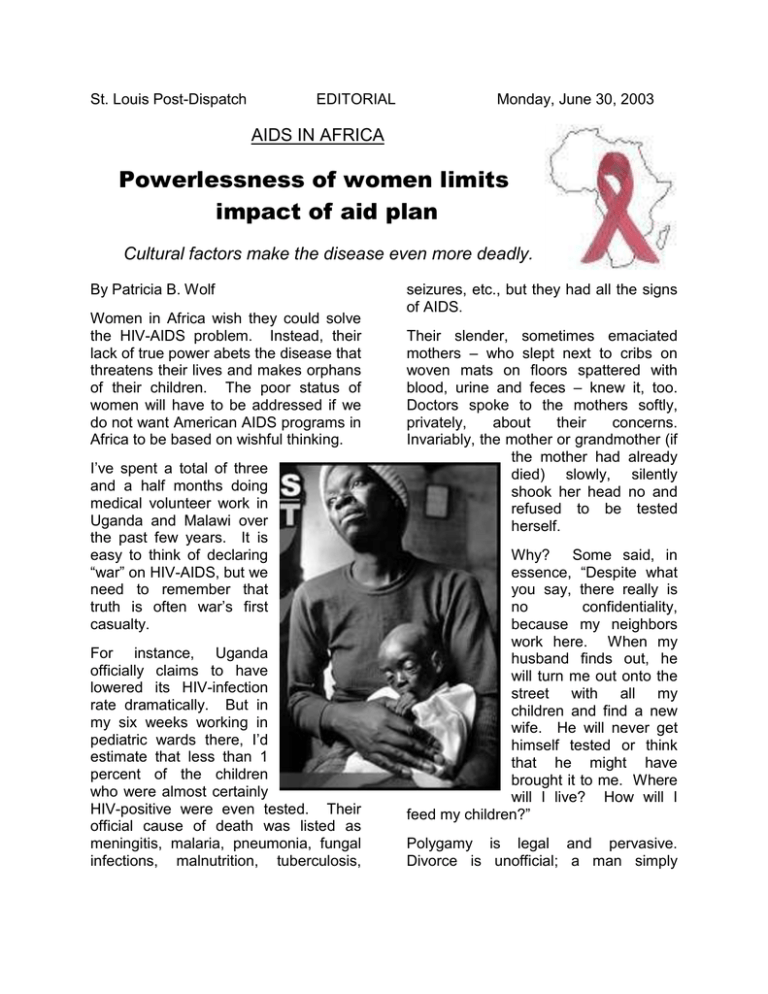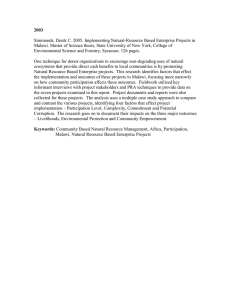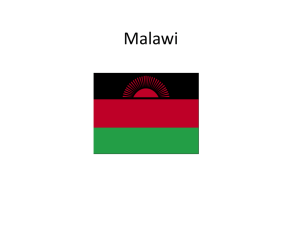AIDS in Africa and Gender Roles
advertisement

St. Louis Post-Dispatch EDITORIAL Monday, June 30, 2003 AIDS IN AFRICA Powerlessness of women limits impact of aid plan Cultural factors make the disease even more deadly. By Patricia B. Wolf Women in Africa wish they could solve the HIV-AIDS problem. Instead, their lack of true power abets the disease that threatens their lives and makes orphans of their children. The poor status of women will have to be addressed if we do not want American AIDS programs in Africa to be based on wishful thinking. I’ve spent a total of three and a half months doing medical volunteer work in Uganda and Malawi over the past few years. It is easy to think of declaring “war” on HIV-AIDS, but we need to remember that truth is often war’s first casualty. For instance, Uganda officially claims to have lowered its HIV-infection rate dramatically. But in my six weeks working in pediatric wards there, I’d estimate that less than 1 percent of the children who were almost certainly HIV-positive were even tested. Their official cause of death was listed as meningitis, malaria, pneumonia, fungal infections, malnutrition, tuberculosis, seizures, etc., but they had all the signs of AIDS. Their slender, sometimes emaciated mothers – who slept next to cribs on woven mats on floors spattered with blood, urine and feces – knew it, too. Doctors spoke to the mothers softly, privately, about their concerns. Invariably, the mother or grandmother (if the mother had already died) slowly, silently shook her head no and refused to be tested herself. Why? Some said, in essence, “Despite what you say, there really is no confidentiality, because my neighbors work here. When my husband finds out, he will turn me out onto the street with all my children and find a new wife. He will never get himself tested or think that he might have brought it to me. Where will I live? How will I feed my children?” Polygamy is legal and pervasive. Divorce is unofficial; a man simply throws a woman out. The reverse is not possible. In Malawi, the official HIV-positive rate is 15 percent of the population. However, in an anonymous study of pregnant women seeking prenatal care in the Lake Malawi region, the rate was 70 percent. The explanation for this appalling figure lies in lifestyle. Wives are in charge of the children, house and the food. The husbands are fishermen, away from home for weeks or months at a time, selling their catches at local villages and spending the money on alcohol and women. Condom use is not part of the culture. Back home, when the wife and mother runs out of money and food, she prostitutes herself to feed the kids. In some places in Malawi, if a man with some kind of power – financial, political or physical – insists that a woman have sex with him, she must oblige. It is not considered rape. I was invited to a charismatic prayer meeting under a tarp in a woman preacher’s back yard in Malawi. There, 150 women plus babies alternately witnessed to their “troubles at home” and sang songs to God asking that their husbands receive the Holy Spirit. They described husbands going off with prostitutes and other women “even though the radio is full of news about the killer AIDS.” The preacher said, “We must pray that God releases our men from their chains of sin and saves us all. We must wear our PUSH (pray Until Something Happens) shirts and spend the whole afternoon praying and waiting for God’s blessings to descend upon us. Sometimes, God comes in the form of a dog, or a child, or a cat.” Who can make sense of this kind of desperation? It’s well established that the educational level of a mother is the best predictor of the fate of her child. When women have the ability to independently feed and shelter their children, then they can insist on monogamy, abstinence, and condoms. Until then, America’s AIDS programs are likely to be not much more than employment programs for men. Patricia B. Wolf, M.D., is a clinical associate professor at Washington University and a pediatrician in private practice at Forest Park Pediatrics, St. Louis. 1999 Something to think about! Check out a proposal for empowering women in Africa. http://www.microcreditsummit.org/press/ Africanmicro.htm



